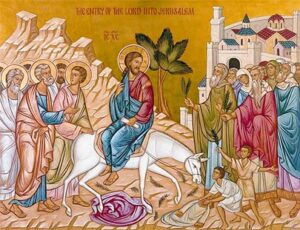
Icon – Entry into Jerusalem
One surprise for me when I converted to Orthodoxy was the frequency of church services during the week. After several years of being an Orthodox Christian I began to understand that the middle of the week services was a form of Christian discipleship. Being at the services deepens one’s prayer life and serves as a “Sunday School” lesson of sorts.
How should one view these services? They are not “good works” to earn “brownie points” with God. A more Orthodox perspective is to view attendance at these services as an expression of Christian discipleship, a means of uniting one’s self with Christ.
The middle of the week services – feast days – are not distributed evenly throughout the year. Sometimes there are no services and other times there are multiple services during the week. Holy Week is full of services. These services offer us an opportunity to follow Jesus Christ in the final week of his life. Oftentimes when we read the Bible we feel in our hearts: “I wish I had been there.” This can happen in the Holy Week services. The Holy Week services in Orthodoxy have a sacramental aspect to them. By the grace of the Holy Spirit we are no longer separated by time from the life of Christ recounted in the Gospels. Through the services we are there when Jesus raises Lazarus from the dead and when he enters Jerusalem on the donkey. We are there at the Last Supper, and we stand with Mary and the beloved disciple at the foot of the Cross. We are also witnesses to Judas’ betrayal and Peter’s denial. All this takes us to the wrecking of hell and Christ’s glorious resurrection.
Holy Week is part of the ancient tradition of the Church. Its roots go back to the second and third century when candidates were prepared to undergo baptism on Easter Sunday. In the fourth century the services celebrating Christ’s death and resurrection were elaborated becoming longer and more complex. The result of this evolution can be seen in the Holy Week service book almost 500 pages long! Many church members have a copy of the Holy Week service book to help them to follow along.
Holy Week commences after Palm Sunday on Sunday night. Below is a general outline of the Holy Week services.
Sunday night, Monday night, Tuesday night – Bridegroom services. The name of the services come from the parable of Ten Virgins (Matthew 25:1-13) in which a group of virgins are waiting for the arrival of the bridegroom. Some stayed awake and were ready to receive the bridegroom while others dozed off and were not there to greet the bridegroom when he came.
Wednesday night – Holy Unction service. This services teaches us about salvation as healing, both spiritual and physical. At the end of the service the Orthodox faithful go up to be anointed by the priest. Because Holy Unction is a sacrament visitors should refrain from going up to receive it; but they are free to watch the service.
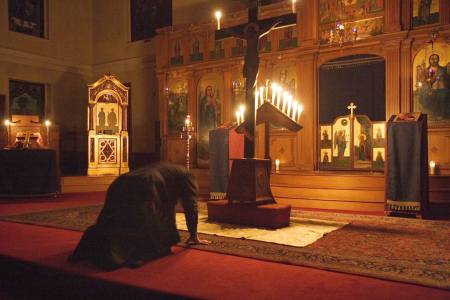
Holy Thursday Service at St. Mary Orthodox Church in Cambridge, MA.
Thursday night – This service is also known as the Twelve Gospels. In this service the Gospel accounts of Christ’s betrayal and the events leading up to his death are read out loud in twelve separate excerpts. In this service one is literally saturated with Scripture. During this service the priest carries the cross around the sanctuary like Jesus did. Then the icon of the crucified Christ is affixed onto the Cross and the parishioners line up to bend down and kiss Christ’s feet. We kiss Christ’s feet to show our appreciation of the fact that Christ died for our sins.
Friday night – In this service we celebrate Christ’s burial in the tomb and also his descent into hell. There is a joy atmosphere in this service because it was not so much that death defeated Christ but rather that his death destroyed Death itself.
When You, the Immortal Life, descended to Death, You struck Hades dead with the lightning of the Godhead; and when you raised up the dead from the abyss, all the powers of Heaven cried aloud; “O life-Giver, Christ, our God, glory to You! (p. 373)
Visitors will see the entire congregation processing around the church. Up in the front is a group of men carrying on their shoulders a wooden table covered with flowers. The “epitaphion” is a table on which is an image of Jesus Christ lying in state. We mourn Christ’s death but we also rejoice because by his death Death is destroyed. One could say that this is a funeral procession in reverse!
Saturday night/Sunday morning – The Pascha (Easter) service is the high point of the Orthodox year. On this night we celebrate Christ’s rising from the dead. His resurrection is proof that death is not final and that one day we too will be resurrected.
O King and Lord, having slept in the flesh as a mortal, You arose on the third day, raising up Adam from corruption, and abolishing Death. O Pascha of incorruption, the salvation of the world. (p. 457)
One deeply engrained habit among Protestants is celebrating Easter on Sunday morning. Many attend a sunrise service to celebrate Easter, but this is not the case for the Orthodox. We go to church late Saturday evening. In many Orthodox churches the Easter service begins at midnight and goes on into the early morning hours.
As an example of the Protestant mental habits the first time I attempted to visit an Orthodox Easter service I called the church office, the lady who answered the phone told me that their Easter service was being held that Saturday night. I had a hard time believing her so I went to the Orthodox Church that Sunday morning and heard the Gospel account of the resurrection being read by at least a dozen different languages. This is the Agape Vespers service. At the end of that service I saw children going up to receive a chocolate Easter bunny; I thought to myself: “That’s a funny way of doing Communion.” Looking back, I can only smile at my naiveté about Orthodoxy. I learned from my mistake and the following year I was there for the real thing.
Lurkers Alert!
Holy Week is a good time for lurkers to learn more about Orthodoxy. Call the local Orthodox Church and ask about the Holy Week services. Then sneak in quietly into the back pews and listen to the prayers and chants. Don’t be surprised if you get lost or feel overwhelmed. This is not Orthodoxy lite but the deep waters of Orthodox worship.
Practical Tip #1: It would probably be a good idea to find out how much of the service will be in English. Some Orthodox parishes will do more of the service in the language of the old country. If you have an Orthodox friend, the friend can guide you along in the often confusing complexity of the services. And don’t be surprised if even long time Orthodox get lost during the services!
Practical Tip #2: Don’t feel obliged to do anything. Some Protestants might feel nervous and anxious when they see people doing prostrations or kissing icons. We’re happy you are visiting us and we don’t expect non-Orthodox do the same thing we do.
Robert Arakaki
Sources
George L. Papadeas, compiler and translator. 2003. Greek Orthodox Holy Week & Easter Services. New English Translation. Patmos Press.
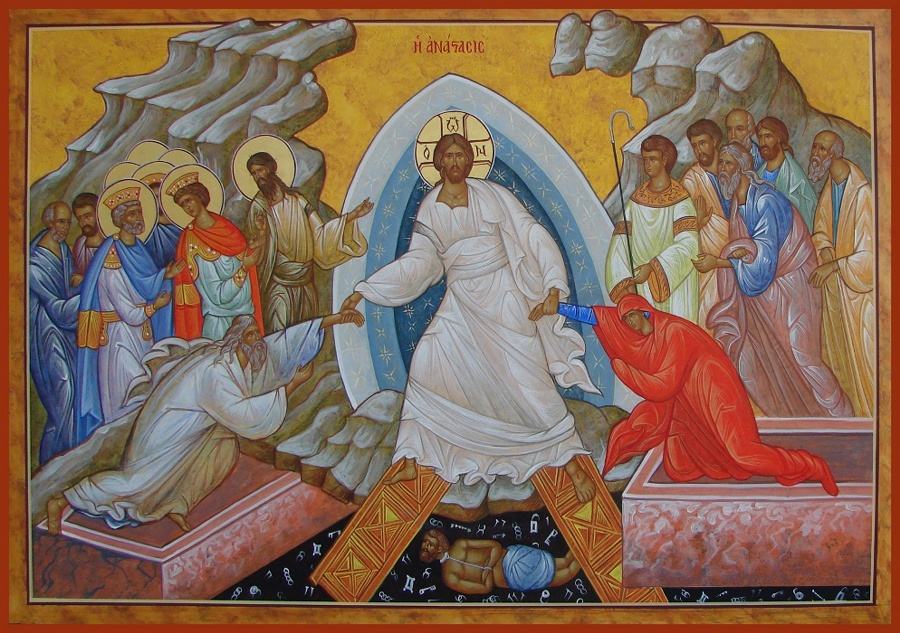
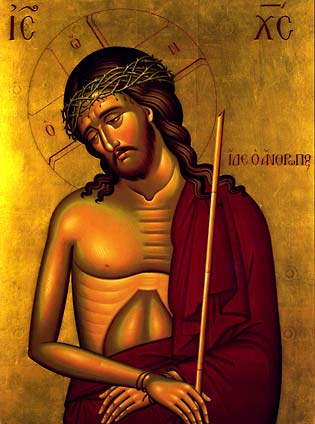

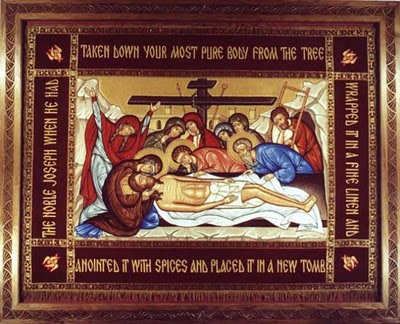
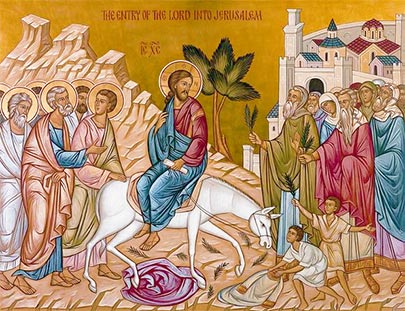

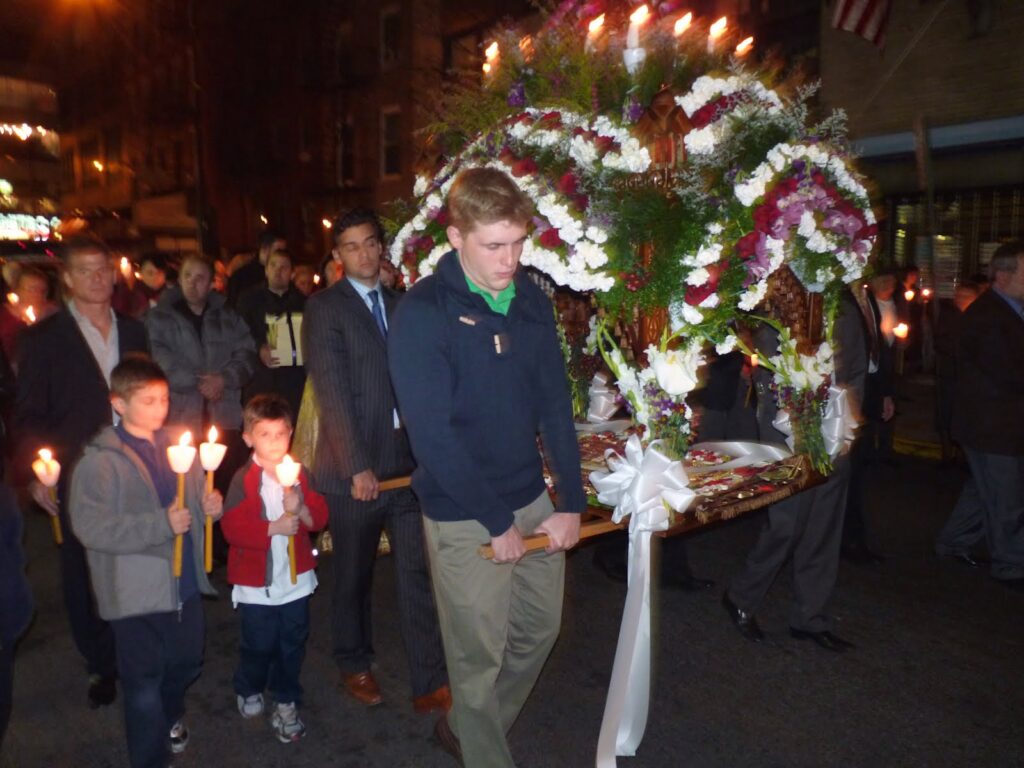
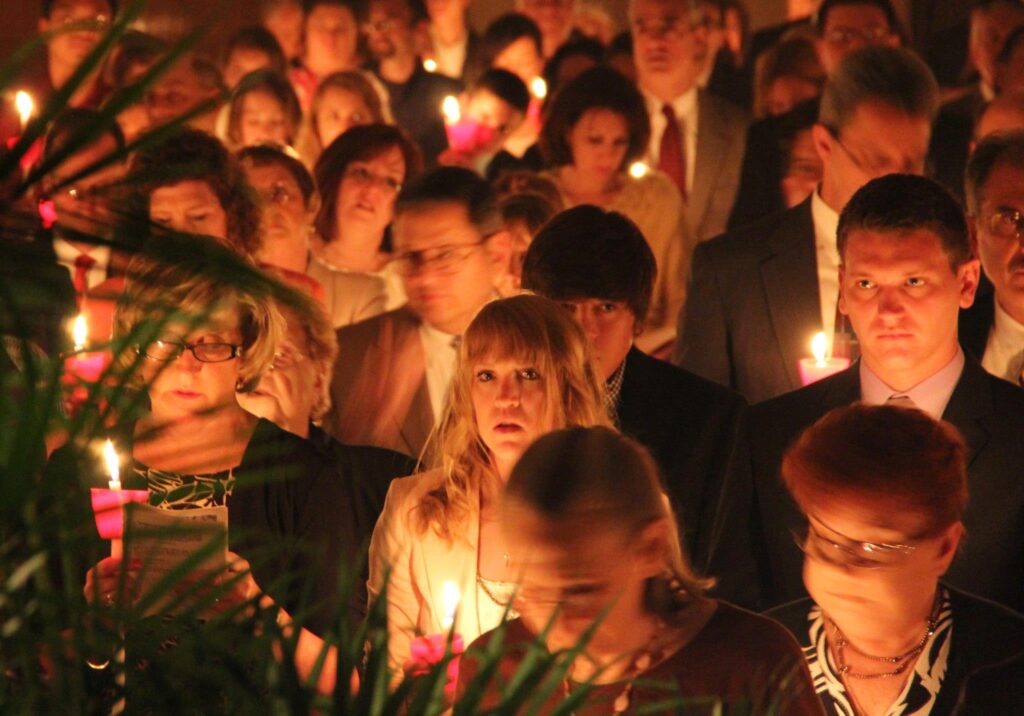
Recent Comments